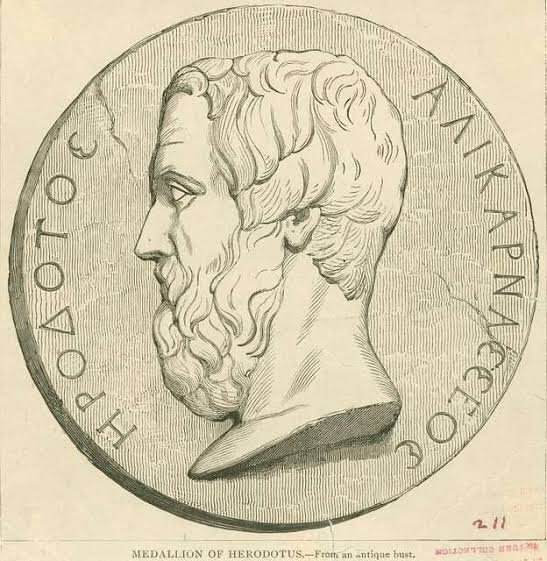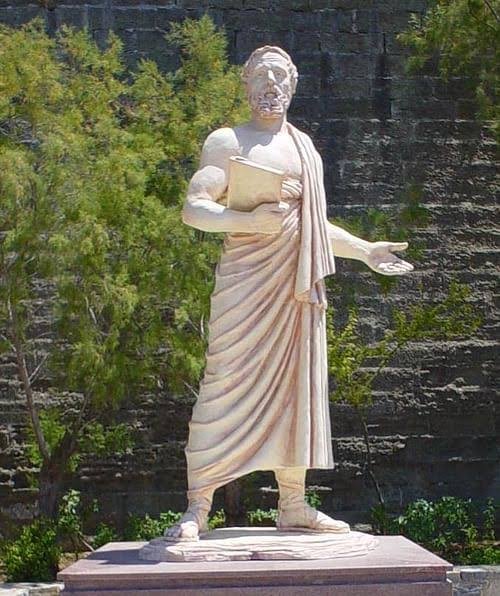Herodotus, an ancient Greek historian, is often referred to as the “father of history.” He wrote many of the first historical accounts. It is generally agreed that he was the first historian to gather and record true knowledge about the past in a methodical manner, as opposed to depending primarily on myths and stories. Herodotus is most well-known for his book titled “The Histories,” which is a historical account of the events that occurred both before and after the Persian Wars. Herodotus’ contributions to the discipline of history are generally acknowledged and revered, despite the fact that his techniques of historical investigation may not have been totally impartial by today’s standards.
life of Herodotus
Around the year 484 BCE, Herodotus was born in the city of Halicarnassus, which is located in what is now the southwestern region of Turkey. He was well educated in the classical Greek tradition and came from an affluent family. Herodotus most certainly engaged in significant travel across the Mediterranean realm and the Near East, and it’s possible that he was involved in commercial activity or diplomatic endeavours.
It was in the middle of the fifth century BCE that Herodotus started writing “The Histories,” and it took him several years to finish the book. It is reported that he repeated sections of it during the Olympic Games that were held in Olympia, Greece, in the year 440 BCE. The first effort to provide a thorough, accurate account of the events of the past, “The Histories” was a ground-breaking work in the study of history since it was the first attempt to produce a history book.
The writing style of Herodotus was often criticised by those who lived during his day because it made extensive use of narrative methods and had a propensity to incorporate rumours and hearsay. Despite this, his work has had a significant impact in the decades that have passed since it was first published, and it continues to serve as an essential resource for learning about the ancient world.
It would seem that Herodotus spent the remainder of his life travelling and writing after he finished “The Histories.” It is believed that he passed away at the city of Thurii, which is located in southern Italy, in the year 425 BCE.
Read Also
- Baby Animal Names: 150 Baby Animal Names | The Big List
- Months Name in Hindi and English – 12 महीनों के नाम – 12 Months Name in Hindi
education of Father of History
Due to the fact that Herodotus was born into a rich family at Halicarnassus, which was an important cultural and economic hub in the ancient world, it is probable that he had a good education. He would have had access to the finest education that was available in the Greek tradition, which would have included teaching in disciplines such as grammar, rhetoric, mathematics, and music. He would have also had access to the highest education that was accessible.
Herodotus would have been subjected to a wide range of cultural influences in addition to his formal education as a result of his travels and interactions with people from various parts of the Mediterranean world and the Near East. This would have occurred in addition to Herodotus’s formal education. This would have provided him with a one-of-a-kind perspective on the history and cultures of the countries he travelled through, which he was afterwards able to draw upon in his work.
In general, although we do not have specific information about Herodotus’s education, it is likely that he received a thorough and varied education that prepared him for his future career as a historian and writer. This is despite the fact that we do not have detailed information about Herodotus’s education.
travel
Herodotus’ life and his work as a historian were both greatly influenced by his extensive travel. Egypt, Persia, Babylon, and the Greek colonies in Italy and Sicily are just some of the destinations that are said to have been on his itinerary during his lengthy travels around the Mediterranean and Near East regions.
Herodotus was able to gather first-hand knowledge about the people, civilizations, and historical events that he subsequently recounted in “The Histories” as a result of his journeys around the ancient world. He not only acquired material from written archives and monuments, but he also conducted interviews with persons who had first-hand knowledge of the events he was narrating.

Herodotus was interested in a variety of topics throughout his travels, including the topography, flora and wildlife, and local traditions of the areas he explored. In addition to gathering historical data, he did so. His work contains not only descriptions of the natural environment, but also reflections about the lifestyles and customs of the people he met throughout his travels.
Herodotus’ extensive travels almost certainly had a role in broadening the scope of his understanding of the ancient world. He was able to test and broaden his own beliefs and perspectives on the world by interacting with individuals from a variety of cultural backgrounds and gaining knowledge from such interactions.
author
Herodotus is largely recognised as one of the most important writers to emerge from ancient Greece, and “The Histories,” the book he penned, is universally acknowledged as a historical literary masterpiece.
Herodotus is well-known as an author due to his captivating writing style and the use of storytelling tactics that he used in order to bring historical events to life. His writing combines factual information with narrative, using vivid descriptions and stories in order to make the events he narrates more approachable and engaging to the people who read it.
Herodotus’ work demonstrates not just his expertise in history but also his wider interests in politics, geography, and culture. As he writes about his journeys, he often adds in-depth accounts of the locales and populations he came across along the way. These accounts offer illuminating perspectives on the norms and practises of the ancient world.
Herodotus’s work was subject to criticism, despite the fact that he used a novel method to the compilation of historical accounts. Several of his contemporaries believed that his writing was excessively prejudiced or that he relied excessively on rumours and hearsay. Yet, “The Histories” has stood the test of time as a great piece of historical writing and literary work, and it remains an influential source of ideas for academics and readers even now.
death
It is not known for certain when or under what circumstances Herodotus passed away; nonetheless, it is thought that he passed away around the year 425 BCE, when he was either in his late 50s or early 60s.

Tradition has it that Herodotus passed away at the Greek colony of Thurii, which was located in southern Italy. He had been a resident of this area for some time. On the other hand, there is no hard proof to back up this allegation, and it is likely that he passed away in another location.
Herodotus is widely regarded as the “father of history,” despite the fact that the circumstances of his death are shrouded in mystery. His legacy lives on to this day. His book, “The Histories,” has had a significant effect on the field of historical research as well as the writing of historical accounts, and his influence can be seen in the works of a great number of historians and authors who have followed after him.

1 thought on “Who is father of history? | Father of History – Herodotus”